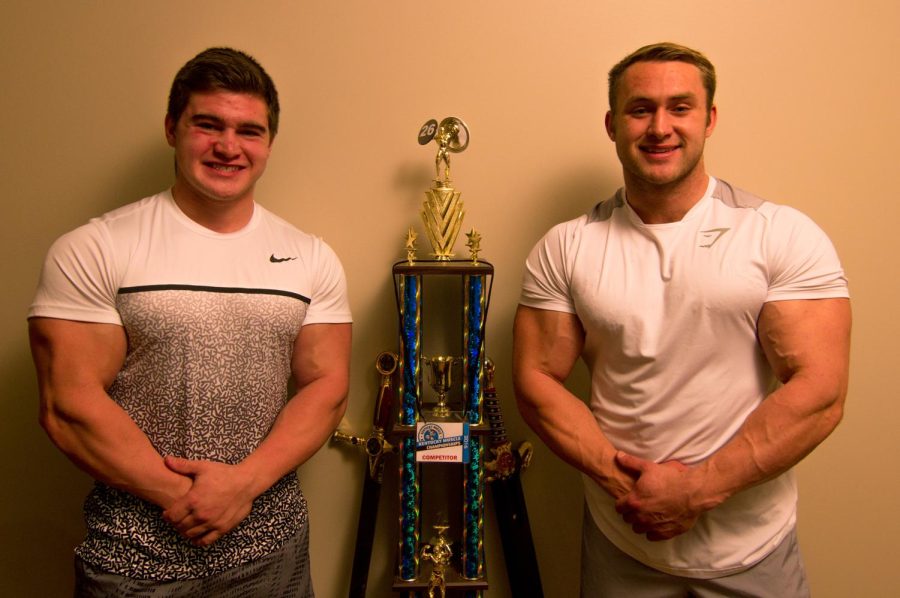Bodybuilder brothers reshape lives through challenging sport
Brothers Bob and Will Blair stand next to their bodybuilding championship trophy on Tuesday, Jan. 31, 2017.
February 1, 2017
There was a time where Will Blair couldn’t walk.
After suffering a dirt bike accident his senior year of high school, he developed Methicillin-resistant Staphylococcus aureus (antibiotic-resistant Staph) in his left knee. The infection required him to undergo seven surgeries that left him in a wheelchair. By graduation, he weighed 96 pounds.
“I didn’t want to be that little kid anymore,” said Blair, who graduated from Kent State last spring. “I knew the only way out was to lift. So I pushed myself to lift, lift, lift. It was a complete evolution.”
Now Will and his brother, Bob Blair, are decorated competitive bodybuilders that weigh a combined 410 pounds.
A highly demanding sport, bodybuilding requires hours of gym time and, in some cases, extreme dieting. The strategic cycle of strict diet and exercise allows bodybuilders to bulk up while slimming down.
“There is a glory associated with bodybuilding,” said James Kingsley, a health sciences assistant professor. “You look bigger and better than everyone around you. There is glory in the mentality to do that training. I think there is something special in the (regimen).”
While the two have always enjoyed exercising, the brothers didn’t consider full-blown bodybuilding until 2015. Will started first and Bob, who has always been a huge admirer of his brother, decided to follow suit.
“When you see your older brother at the gym all the time, you start to wonder, ‘well, what am I doing?'” said Bob, a junior nutrition major. “He is really the one who got me into it and pursuing it made me the way that I am today.”
Since the brothers began taking bodybuilding seriously, they had to completely change their lifestyles. All distractions had to be cut out of their daily routine. Neither of the brothers drink alcohol and rarely dine out. They don’t even eat ice cream.
“When I was a freshman I partied all the time and was always at the frat houses. Growing up, I quickly realized that this was very important to me,” Will said. “This is something that I may want to do for the rest of my life. I knew that in order to be where I want to be, I had to start getting serious.”
They have been eating the exact same six meals every day for the past two years. Each day they consume 450 grams of carbohydrates — three times more than the amount recommended by The National Library of Medicine.
Every portion of their meals is weighed and calculated to the exact measurements of micronutrients and phytochemicals. Even when they are in their off-season, the numbers are still glued to their memories.
On top of dieting, the brothers also workout between two to three hours daily. It has been a commitment that has sometimes put a strain on their relationships.
“In social settings, yes, bodybuilding has put some stress on my personal relationships,” Will said. “I didn’t have quite that much time for friends or for this or that. Some people saw that and thought that I was being selfish.”
“Back home, there was not a lot of people who accept bodybuilding,” Bob said. “However, here at Kent, all of my closest friends are bodybuilders. We make food for each other and work out together — it’s awesome.”
Their hard work has paid off: Will was first overall at both the Kentucky Muscle and West Virginia Grand Prix competitions. Bob has a second place finish at the Northcoast Championships and a fourth place finish at the Pittsburgh Championships.
To them, the work is worth more than a scoop of ice cream.
“It’s an individual sport, that’s why I love it,” Will said. “What works for me might not work for you. It requires focus; it makes you stronger.”
Rachel Duthie is the student life reporter, contact her at [email protected].

























